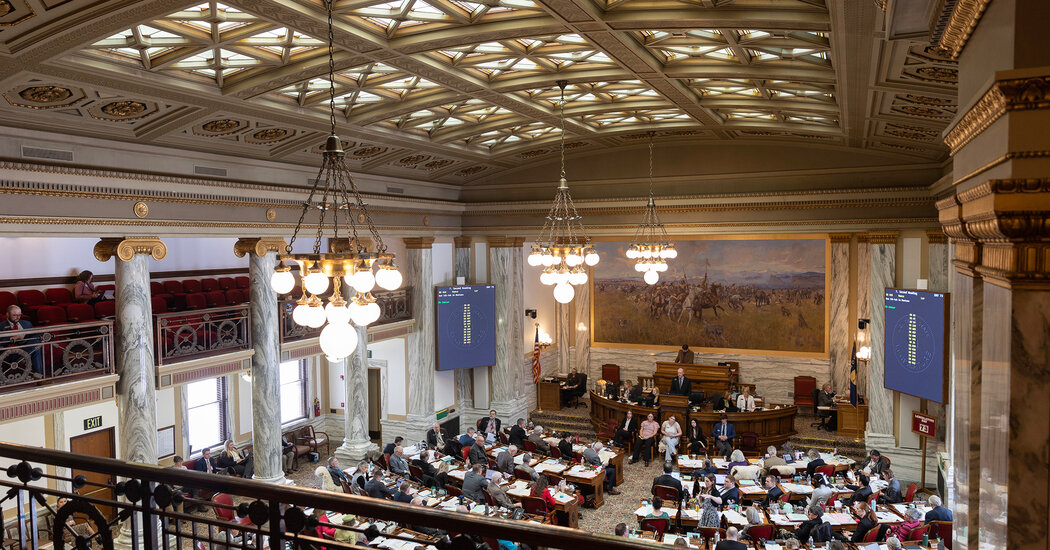TikTok sued Monday to prevent Montana from banning the popular video app, stepping up its efforts to stop a ban that would be the first of its kind in the country.
In a lawsuit filed in U.S. District Court for the District of Montana, the company said Montana’s legislation violated the First Amendment and parts of the U.S. Constitution that limit state powers. The ban was “unconstitutionally closing the forum to speech for all speakers on the app,” the company said in the lawsuit.
TikTok sued just days after Montana Governor Greg Gianforte signed the ban — which would fine the app if it operated in the state or in app stores if they were allowed to download — into law.
The state law has become a test case for whether it is possible to ban the use of TikTok, which is owned by Chinese internet company ByteDance, due to national security concerns. The ban, which takes effect Jan. 1, has already raised questions about how it would be enforced within Montana’s borders.
“We are challenging Montana’s unconstitutional TikTok ban to protect our company and the hundreds of thousands of TikTok users in Montana,” Brooke Oberwetter, a TikTok spokeswoman, said in a statement. “We believe our legal challenge will prevail based on an extraordinarily strong set of precedents and facts.”
Emily Flower, a spokeswoman for Montana Attorney General Austin Knudsen, said: “We anticipated legal challenges and are fully prepared to defend the law that helps protect the privacy and safety of Montanans.”
The lawsuit adds to those legal challenges. A group of TikTok users filed a separate lawsuit against Montana’s bill on Wednesday, the day Gianforte signed it into law, saying it violated their First Amendment rights and exceeded state legal authority. The law has also sparked protests from civil liberties and digital rights groups, including the American Civil Liberties Union and Columbia University’s Knight First Amendment Institute.
TikTok, which has more than 150 million US users, was in limbo under two presidential administrations as it worked to allay concerns about its Chinese ownership. The company, which has been waiting for the Biden administration to approve its plan to operate in the United States, has already faced bans on government devices in more than two dozen states, as well as by universities and the military.
The ban in Montana was drafted by Mr. Knudsen, a Republican, and introduced this year by a Republican senator. Lawmakers in the state said the ban would prevent the Chinese government from accessing Montanans’ personal information. Debate over the ban began shortly after a Chinese spy balloon floated over the state, drawing national attention.
The new law prohibits TikTok from using the app in the state. App store operators, such as Apple and Google, are also prohibited from making it available for download in the state. TikTok, Apple and Google risk daily fines of $10,000 if they don’t follow the rules.
In its lawsuit, TikTok said Montana did not have the legal authority to enforce a ban because it would regulate interstate commerce, which is the purview of the federal government. The ban also violates a constitutional ban on legislation targeting an individual or specific groups for punishment, the lawsuit argued.
“The TikTok ban singles out the TikTok application for this penalty, despite the fact that the data allegedly collected by the app is no different than data collected from a number of other sources and widely available on the market for data brokers,” the company said. said in his complaint.
Critics of the ban think it will be difficult to enforce even if the courts don’t block it. TikTok users in Montana can still use the app if they disguise their location using virtual private network software, while Montana residents living in border towns can get internet access through cell towers in other states. TechNet, a lobbying group representing Apple and Google, has said it is impossible for the app stores to restrict downloads in a single state.
Mr Knudsen’s office said last week that TikTok could enforce the ban using technology the online gambling industry is already using to block access to an app from a state where it is illegal.
The ban process could take months to resolve. Because the ban would not take effect until next year, there is no immediate need for the courts to enforce it.
TikTok and its supporters have managed to use the courts to stop an earlier ban in the United States. In 2020, TikTok sued the federal government when President Donald J. Trump used his economic emergency powers to issue an executive order preventing the app from working in the United States. A judge sided with the company, and another judge blocked the ban after a challenge from a group of creators.
TikTok has been banned in some countries, including India in 2020. Britain, Canada, and France recently banned the app on official government devices.

